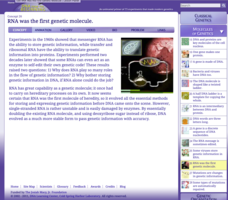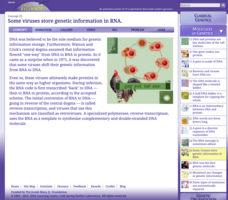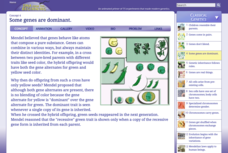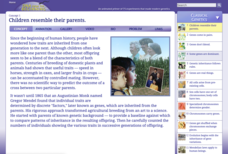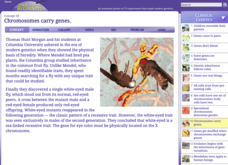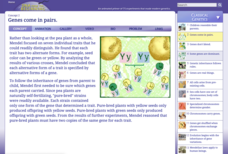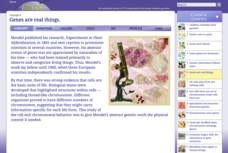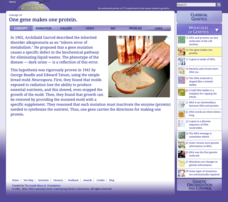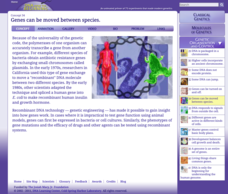Cold Spring Harbor Laboratory
Genetic Inheritance Follows Rules
Rules are not meant to be broken in genetics. Scholars learn to build Punnett squares to track the inheritance of dominant and recessive traits in an interactive animation activity. Online questions help individuals reflect on their...
Howard Hughes Medical Institute
Central Dogma and Genetic Medicine
Scientists work every day to find solutions to genetic diseases. Scholars learn about the process of gene sequencing, mutations, and the results. They explore genetic diseases and therapies to intervene and help and, through case...
Cold Spring Harbor Laboratory
RNA Was the First Genetic Molecule
Can organic molecules come from a pre-biotic environment? Stanley Lloyd Miller proved it is possible when exactly the right conditions exist. Learn about his experiment and the other experiments later building off of it that changed the...
Cold Spring Harbor Laboratory
Mutations Are Changes in Genetic Information
A red delicious apple tree with a simple mutation means we now benefit from the existence of golden delicious apples. Learn how simple mutations change genetic information in DNA sequences. Using biographies, videos, and animations,...
Howard Hughes Medical Institute
Genetic Switches
Is it reasonable for us to alter genes in plants to make them more nutritious and better tasting? Is it reasonable for us to alter genes to make babies smarter or better looking? The human genome contains millions of gene switches for...
Cold Spring Harbor Laboratory
Some Viruses Store Genetic Information in RNA
Can a high school program alter the entire course of your life? David Baltimore and Howard Temin participated in high school programs working in research laboratories and went on to win the 1975 Nobel Prize. Learn about these two...
Cold Spring Harbor Laboratory
Some Genes Are Dominant
Dominate a lesson on genetic traits. Young scholars learn about the difference between dominant and recessive traits with an interactive lesson. An animation demonstrates Mendel's work on the inheritance of traits, and interactive...
Cold Spring Harbor Laboratory
Children Resemble Their Parents
Gregor Mendel's work revolutionized agriculture from an art to a science. Explore Mendel's work with an interactive lesson that includes animations, video, and practice problems. The instruction describes the early discoveries that...
Cold Spring Harbor Laboratory
Chromosomes Carry Genes
Some traits only exist in males and some only in females. Pupils learn how the location of genes on sex chromosomes determines them using an interactive lesson. An animation illustrates how scientists know this to be true and shows how...
Cold Spring Harbor Laboratory
Genes Don't Blend
Yellow and blue make green—unless you're studying the inheritance of genetic traits. An interactive lesson explains the difference between blended traits and pure traits and gives examples of their occurrence. The resource includes a...
Cold Spring Harbor Laboratory
Genes Come in Pairs
Mendel was the first to look at individual traits within a species. Step in his shoes as an interactive lesson takes users through his journey. An animation describes the design of his experiments and how he isolated individual traits to...
Howard Hughes Medical Institute
Recent Adaptations in Humans
You've probably spent plenty of time discussing animal adaptations with your young biologists, but what about human adaptations? Explore the evolving traits of humankind through an interactive that combines text and video clips. Scholars...
Howard Hughes Medical Institute
Vertebrate Circulatorium
When you get to the heart of the matter, you learn a lot about an organism by studying its circulatory system! A perfect resource for a zoology or anatomy class, the simulation gives users a peek inside a variety of vertebrates to...
Cold Spring Harbor Laboratory
DNA Words Are Three Letters Long
DNA writes 64 different words but only codes for 20 different amino acids. Budding scientists learn about where each of these numbers come from and why they aren't equal with an online interactive. The resource explains the research, the...
Cold Spring Harbor Laboratory
DNA Is Only the Beginning for Understanding the Human Genome
Mario Capecchi requested funding for a new procedure targeting genes and was rejected. Four years later, after he proved it worked, the NIH apologized and funded his research. Use an online interactive to learn about his research and the...
Cold Spring Harbor Laboratory
Genes Are Real Things
Proving microscopic structures exist is a difficult task. Learn how scientists did just that in the mid-1800s as they set out to identify the cellular structures related to genetics. The online lesson explains the collection of work that...
Howard Hughes Medical Institute
Niche Partitioning and DNA Metabarcoding
What is DNA metabarcoding? Show your biology class the latest method for studying biodiversity in an ecosystem with a fun, informative interactive. Individuals examine the animal species that compete for vegetation, then learn how their...
Cold Spring Harbor Laboratory
Mendelian Laws Apply to Human Beings
Why are so many inherited diseases more prevalent in populations of specified races? Scholars learn about pedigrees and genetics using a reading, an animation, primary sourced letters, a short video, a biography, a guided practice...
Cold Spring Harbor Laboratory
Some Types of Mutations Are Automatically Repaired
Does natural light damage or repair DNA? Learn the answer discover the scientists who researched the topic with an online interactive. Scholars read through an online animation presenting the content at their own pace. Then, they read...
Cold Spring Harbor Laboratory
One Gene Makes One Protein
Very few universities still offer a master's degree in the ecology of grasses, but that was the degree that led George Wells Beadle to an interest in genetics and later a Nobel Prize. Scholars learn about the discoveries of Dr. Beadle...
Cold Spring Harbor Laboratory
Genes Can Be Moved Between Species
Biotechnology changes lives every day, but how did it all start? Learn about Cohen and Boyer's technique for recombinant DNA and the founding of this new scientific study. Then, scholars use the online interactive to discover how Hanahan...
American Museum of Natural History
Ocean Creature Feature
From coloring to hard protective shells, ocean creatures have adaptation features that help them survive. An eight-question online quiz highlights different ocean animals and their unique characteristics. The resource then offers pop-up...
Howard Hughes Medical Institute
BCR-ABL: Cancer Protein Structure and Function
How do scientists discover treatments for cancer? A presentation and accompanying worksheet explain how one cancer spreads and a theory of how to stop it. It details the trials and relapses after using the medication. Scholars learn...
American Museum of Natural History
What's This? Staying Safe
Amaze the class with the creative adaptations species employ to trick predators. An online interactive lesson introduces learners to six different species with unique adaptations. Each species highlights a different adaptation and its...


